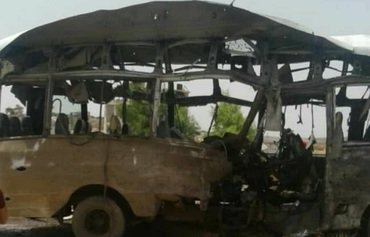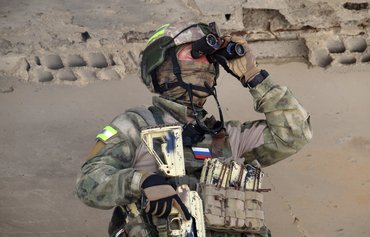Syrians driven to leave their homeland out of fear and desperation were among the many victims -- and traumatised survivors -- when an overloaded migrant boat capsized last week off the coast of Greece.
Nine Egyptians have been charged with human trafficking in connection with the shipwreck and remanded after they survived the disaster and were arrested last week in the port of Kalamata, a Greek legal source said Tuesday (June 20).
At least 82 people drowned in the June 14 shipwreck, with hundreds more missing, in one of the eastern Mediterranean's worst tragedies in recent years.
The 104 survivors hail mainly from Syria, Egypt and Pakistan. The authorities still have no clear idea how many were aboard the boat when it sank, with estimates ranging from 400 to more than 700.
![Survivors of a shipwreck stand at a warehouse in Kalamata, Greece, on June 15, after a boat carrying dozens of migrants, including more than 100 Syrians, sank in international waters in the Ionian Sea. [Angelos Tzortzinis/AFP]](/cnmi_di/images/2023/06/22/42710-shipwreck-greece-survivor-600_384.jpg)
Survivors of a shipwreck stand at a warehouse in Kalamata, Greece, on June 15, after a boat carrying dozens of migrants, including more than 100 Syrians, sank in international waters in the Ionian Sea. [Angelos Tzortzinis/AFP]
![A picture taken during a tour organised by the Syrian Ministry of Information in September 2021 shows Syrian and Russian flags flying above a damaged building in the district of Daraa al-Balad in Daraa, Syria. [Louai Beshara/AFP]](/cnmi_di/images/2023/06/22/42711-Syrian-Russian-flags-600_384.jpg)
A picture taken during a tour organised by the Syrian Ministry of Information in September 2021 shows Syrian and Russian flags flying above a damaged building in the district of Daraa al-Balad in Daraa, Syria. [Louai Beshara/AFP]
At least 141 Syrians were aboard the boat, which overturned in the Ionian Sea after departing from Libya towards Italy, relatives and activists said.
Activists at the Daraa Martyrs Documentation Office on Saturday said 106 passengers aboard the boat were from southern Syria, mainly Daraa province.
So far, only 34 of the Syrians are known to have survived, they said.
Speaking to AFP by telephone on Saturday, Iyad from the Daraa province town of Jassem said his 19-year-old son Ali was still unaccounted for.
The teenager was looking for a better life in Libya, his father said, and had travelled there by plane from Damascus.
"He told us he wanted to work in a restaurant" and had planned to send money to help the family, Iyad added.
Iyad said Ali's uncle in Germany had travelled to Greece to search for the boy, but "it's like looking for a needle in a haystack".
"For us, he is missing. We have not mourned, and we will not mourn until we are sure what has happened," he said.
A blind 15-year-old boy and his 28-year-old sister from Daraa were among those on board, said their uncle, who declined to be named for security reasons.
"We have no trace of them; my nephew is blind and does not know how to swim," he said, adding the pair had flown nonstop from Damascus to Libya.
"He lived a tough live, hearing the sounds of battles for years. He lived in fear and probably died in fear," the uncle sobbed.
Dire circumstances in Daraa
Daraa province was the cradle of the 2011 uprising against Syrian President Bashar al-Assad, but it returned to regime control in 2018.
"It isn't surprising to find so many youths from Daraa on this boat," an activist told AFP, requesting anonymity for security concerns.
"Young people and families have fled Daraa en masse over the years because the living and security situation there is absolutely unbearable."
"Sadness prevails over most cities and towns of the province as residents realise their family members are missing or have perished," Daraa activist Jumaa al-Masalmeh told Al-Mashareq.
So many desperate Daraa residents fled the dire reality in the region, which has very few job opportunities, he said, despite the Syrian regime's repeated promises to revive the area.
Many young residents have been forced to join Iran-backed or Russia-backed militias out of financial necessity, or to get involved in drug trafficking, he said.
Youth who opt to join the militias risk their lives daily, al-Masalmeh said, and even those who choose to stay out of the militias or the drug trafficking networks are not safe.
Crime is rising in Daraa, with rampant theft and the spread of drugs, Cairo-based Syrian lawyer Taher al-Masri told Al-Mashareq.
Public services are lacking and Daraa is not safe, he added, with "security services" left to local militias that act more like gangs.
Commitment to accountability
International donors on Thursday pledged €5.6 billion ($6.1 billion) for Syrian refugees, but the European Union (EU) stressed it will not ease its stance on al-Assad's government.
The EU committed €3.8 billion ($4.1 billion) of the total amount, the United States $920 million and the United Kingdom £150 million ($164 million).
The grants promised are for this year and beyond, to help Syria's neighbours -- including Turkey, Iraq, Jordan and Lebanon -- hosting 5.4 million Syrian refugees, as well as millions of Syrians displaced in their own country.
In addition, the donors committed another €4 billion ($4.3 billion) in loans. The combined grants and loans amount to €9.6 billion ($10.4 billion).
While all the aid is earmarked to help Syrians, EU foreign policy chief Josep Borrell stressed it was not going to the Damascus government led by al-Assad.
"The European Union policy on Syria has not changed," he said.
"We will not re-establish full diplomatic relations with the al-Assad regime or start working on reconstruction until a genuine and comprehensive political transition is firmly on the way, which is not the case."
He added that "we have to remain committed to the justice and accountability for the crimes committed during more than a decade of conflict".
Al-Assad, who stayed in power thanks to support from allies Iran and Russia, was readmitted to the Arab League last month.
But after more than a decade of exile from the bloc, Syria still has a long way to go before it can truly restore ties with the region, many predict.
Paying the ultimate price
Residents of the southern provinces were among the first to rise up against al-Assad's regime as they refused to continue living under its oppression, Sweida activist Nizar Bou Ali told Al-Mashareq.
Now, residents of Daraa and Sweida provinces are leaving their homeland "without hesitation", he said, even though they face great dangers.
"This region is totally deprived of any new projects to provide employment for the youth, and is also deprived of any new infrastructure, or even of plans to repair the old infrastructure," he said.
Faced with continued oppression from the Syrian regime and an "outrageous rise in prices and lack of purchasing power", many consider their best option to be illegal immigration, he said.
But in seeking to flee Syria, many have paid the ultimate price.

![Survivors of a shipwreck sit inside a warehouse at the port in Kalamata, Greece, on June 15, after a boat carrying migrants sank in international waters in the Ionian Sea. [Angelos Tzortzinis/Pool/AFP]](/cnmi_di/images/2023/06/22/42709-Shipwreck-survivors-Greece-600_384.jpg)





